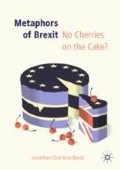Abstract
In this chapter I illustrate two complementary frames for the Brexit debate: the ‘Patriotism and the Nation’ frame and the ‘Distrust and Betrayal’ frame. I show how they distinguish between the positive emotional associations of the ‘Us’ group and the powerful negative fear-based associations of a ‘Them’ group and demonstrate how this corresponds with Haidt’s Loyalty/Betrayal and Sanctity/Degradation moral foundations. The ‘Us’ group is defined by identification with a sacred nation state that is rooted in shared memories arising from historical allegories and myths. The ‘Them’ group is defined by suspicion of an outside group and a distrust of those who do not meet the criteria for identification with the ‘Us’ group. Both frames were introduced by pro-Brexit politicians, and their supporters, but were also sometimes deployed by Remain supporters who sought to harness their persuasive potential. Different genres of political communication reflect orientation to different audiences. I show how Jacob Rees-Mogg systematically employed both frames combining them with his own prophetic style to make predictions of disastrous outcomes should the demands of the Hard Brexiteers not be met. Boris Johnson employs his column in The Telegraph for greater elaboration of his views on Patriotism and the Nation while Jacob Rees-Mogg’s social media posts show evidence of careful attention to language that might be deemed divisive; his more stylish language is through historical, biblical and literary allusion and with use of archaic terms such as ‘vassalage’ and ‘panjandrum’ that enhanced the appeal to Sanctity and Degradation. Both politicians share a strong predilection for metaphor, at times combined with humour and always as a means of engaging audiences. While those supporting Remain employed both frames, they did so in response to their initiation by the Leave campaign and as a result Remain were never calling the rhetorical shots.
Access this chapter
Tax calculation will be finalised at checkout
Purchases are for personal use only
References
Charteris-Black, J. (2011) Politicians and Rhetoric: The Persuasive Power of Metaphor, 2nd edn. Basingstoke and New York: Palgrave Macmillan.
Edelman, M. (1988). Constructing the Political Spectacle. Chicago: Chicago University Press.
El Refaie, E. (2009). Metaphor in Political Cartoons: Exploring Audience Responses. In C.J. Forceville and E. Urios-Aparisi (Eds.), Multimodal Metaphor (pp. 173–96). Berlin: Mouton de Gruyter.
Haidt, J. (2012). The Righteous Mind: Why Good People are Divided by Politics and Religion. London: Penguin.
Orwell, G. (1945). Notes on Nationalism. http://www.resort.com/~prime8/Orwell/nationalism.html.
Shipman, T. (2016). All Out War. London: Collins.
Thompson, M. (2016). Enough Said: What’s Gone Wrong with the Langauge of Politics? London: Penguin.
Author information
Authors and Affiliations
Corresponding author
Rights and permissions
Copyright information
© 2019 The Author(s)
About this chapter
Cite this chapter
Charteris-Black, J. (2019). I Love My Country. In: Metaphors of Brexit. Palgrave Macmillan, Cham. https://doi.org/10.1007/978-3-030-28768-9_3
Download citation
DOI: https://doi.org/10.1007/978-3-030-28768-9_3
Published:
Publisher Name: Palgrave Macmillan, Cham
Print ISBN: 978-3-030-28767-2
Online ISBN: 978-3-030-28768-9
eBook Packages: Literature, Cultural and Media StudiesLiterature, Cultural and Media Studies (R0)

